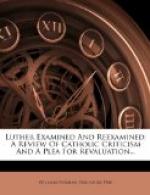“The causes of this institution are at hand. First, the Christians did not like to appear inferior to the Greeks, the Romans, and the other people among whom there were many philosophers and sages, who were distinguished from the vulgar by their dress and their whole mode of life, and who were held in high honor. Now among these philosophers (as is well known) none better pleased the Christians than the Platonists and Pythagoreans, who are known to have recommended two modes of living, the one for philosophers who wished to excel others in virtue, and the other for people engaged in the common affairs of life. The Platonists prescribed the following rule for philosophers: The mind of a wise man must be withdrawn, as far as possible, from the contagious influence of the body. And as the oppressive load of the body and social intercourse are most adverse to this design, therefore all sensual gratifications are to be avoided; the body is to be sustained, or rather mortified, with coarse and slender fare; solitude is to be sought for; and the mind is to be self-collected and absorbed in contemplation, so as to be detached as much as possible from the body. Whoever lives in this manner shall in the present life have converse with God, and, when freed from the load of the body, shall ascend without delay to the celestial mansions, and shall not need, like the souls of other men, to undergo a purgation. The grounds of this system lay in the peculiar sentiments entertained by this sect of philosophers and by their friends, respecting the soul, demons, matter, and the universe. And as these sentiments were embraced by the Christian philosophers, the necessary consequences of them were, of course, to be adopted also.




